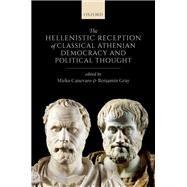The Hellenistic Reception of Classical Athenian Democracy and Political Thought
, by Canevaro, Mirko; Gray, Benjamin- ISBN: 9780198748472 | 0198748477
- Cover: Hardcover
- Copyright: 3/25/2018
In the Hellenistic period (c.323-31 BCE), Greek teachers, philosophers, historians, orators, and politicians found an essential point of reference in the democracy of Classical Athens and the political thought which it produced. However, while Athenian civic life and thought in the Classical period have been intensively studied, these aspects of the Hellenistic period have so far received much less attention. This volume seeks to bring together the two areas of research, shedding new light on these complementary parts of the history of the ancient Greek polis.
The essays collected here encompass historical, philosophical, and literary approaches to the various Hellenistic responses to and adaptations of Classical Athenian politics. They survey the complex processes through which Athenian democratic ideals of equality, freedom, and civic virtue were emphasized, challenged, blunted, or reshaped in different Hellenistic contexts and genres. They also consider the reception, in the changed political circumstances, of Classical Athenian non- and anti-democratic political thought. This makes it possible to investigate how competing Classical Athenian ideas about the value or shortcomings of democracy and civic community continued to echo through new political debates in Hellenistic cities and schools. Looking ahead to the Roman Imperial period, the volume also explores to what extent those who idealized Classical Athens as a symbol of cultural and intellectual excellence drew on, or forgot, its legacy of democracy and vigorous political debate. By addressing these different questions it not only tracks changes in practices and conceptions of politics and the city in the Hellenistic world, but also examines developing approaches to culture, rhetoric, history, ethics, and philosophy, and especially their relationships with politics.
The essays collected here encompass historical, philosophical, and literary approaches to the various Hellenistic responses to and adaptations of Classical Athenian politics. They survey the complex processes through which Athenian democratic ideals of equality, freedom, and civic virtue were emphasized, challenged, blunted, or reshaped in different Hellenistic contexts and genres. They also consider the reception, in the changed political circumstances, of Classical Athenian non- and anti-democratic political thought. This makes it possible to investigate how competing Classical Athenian ideas about the value or shortcomings of democracy and civic community continued to echo through new political debates in Hellenistic cities and schools. Looking ahead to the Roman Imperial period, the volume also explores to what extent those who idealized Classical Athens as a symbol of cultural and intellectual excellence drew on, or forgot, its legacy of democracy and vigorous political debate. By addressing these different questions it not only tracks changes in practices and conceptions of politics and the city in the Hellenistic world, but also examines developing approaches to culture, rhetoric, history, ethics, and philosophy, and especially their relationships with politics.






